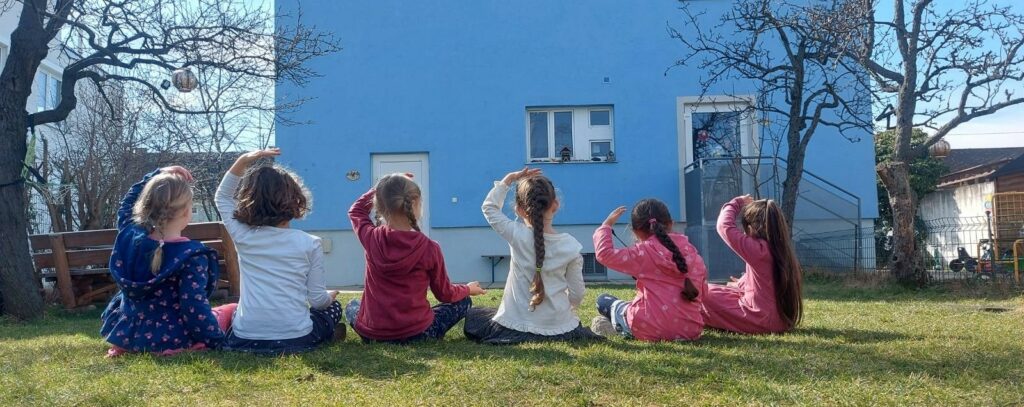Vision/ mission statement of our children’s group:
Each child in itself is a special individual, unique, special and worthy of being treated with full respect and undivided love. Children are active, competent and creative and have diverse social bonding and group building skills. The natural drive for children’s development is characterised by curiosity, inquisitiveness, creativity and spontaneity. Children have different interests, talents and needs as well as diverse modes of expression and competencies. They develop individually according to their respective learning and life rhythms.
The teachers in our children’s group are companions, advisors, interest awakeners, knowledge mediators, as well as motherly confidants who support the children in their development and give them space for free development, but also set clear rules and bring structure into the children’s group’s everyday life.
The aims of our children’s group are to encourage the children’s development and to accompany them on their way as upright and self-confident people in a harmonious, balanced atmosphere, so that they go their way with open eyes and open hearts in their individual way, according to their character and ability.
It is important to us that all people are respected and that the children have the opportunity to grow up multi-ethnically and gain insight into the diverse cultures of humanity. Developing in the children an understanding of the living conditions and traditions of other peoples in order to counteract xenophobia, fanaticism and fear of the unknown is an essential focus of our work.
Equally important to us is the children’s sensitive interaction with nature. We are very fortunate to have our own garden where the children can gain a wide variety of experiences with plants and animals. We want to sensitise our children to the things that attack and destroy our nature. The children are encouraged to look critically at people’s behaviour in nature and to stand up for the protection of the world. The children should become aware of how extraordinary our planet is, so wonderful and unique.
Parent-led children’s group:
We are a private parent-managed children’s group funded by the City of Vienna (MA10). We have two groups in the house, with 14 places per group. One group is for children from 1 ½ to approx. 3 ½ years and the second for 3 ½ – 6 year old children. Both groups are looked after by two teachers each. The group for the older children is bilingual (German/English).
The parents are part of the association and can contribute with their wishes and needs, whereby the administration and organisation is the responsibility of the association’s board. We are also happy to receive help in the house and garden in order to be able to create a common togetherness for the children.
Meditation:
In our pedagogical work, we attach great importance to a holistic approach, as we want to allow freedom for personal and creative development as well as the experience of collective togetherness. For us, holism means viewing the child as a bio-psycho-social-mental-spiritual entity and shaping learning and educational processes accordingly. Learning is a holistic process in which body and psyche are involved. Holistic educational processes are oriented towards the overall personality of the children by addressing their senses as well as their socio-emotional, cognitive and motor skills. In our educational work, we follow the Viennese educational plan for elementary educational institutions.
A special additional focus in our educational concept is meditation following the method of Sahaja Yoga.
Children always need enough time for leisure, relaxation and dreaming as well as the possibility to feel themselves. In meditation, different phases alternate with songs, body movements and massages to enable us to feel our inner system.
The aim of meditation is to lead children in a simple and playful way to relax, to reduce stress, to consciously perceive themselves and their environment, and thus to promote their creativity and concentration. The children learn that they do not have to be constantly occupied and entertained and begin to experience that during meditation their body and mind relax. When the children become physically calm, their stress reduces and they become anxiety free. The children become inwardly free, they pay more attention to their inner voice.
Meditation should also show the children the richness and diversity of religious and cultural traditions and awaken an interest in individual and shared spiritual experience.
